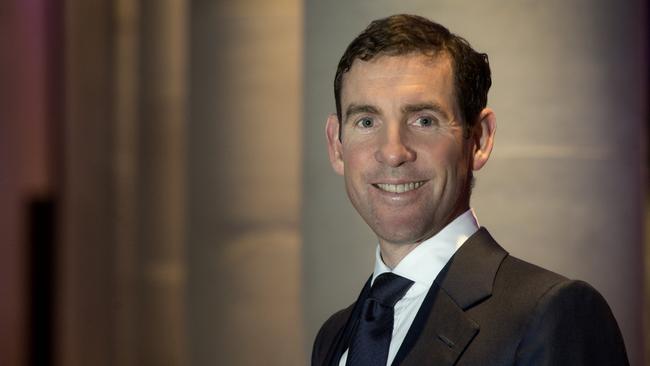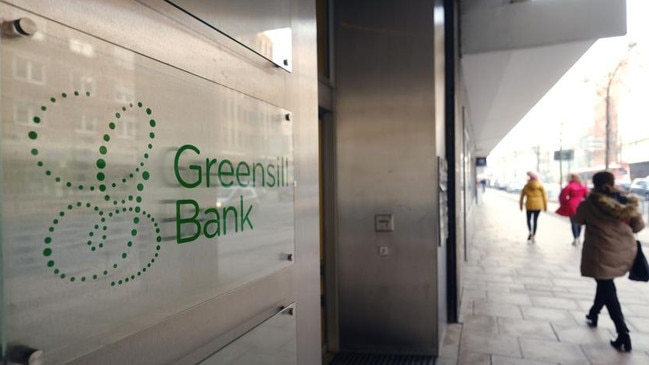Sanjeev Gupta’s GFG Alliance in talks over repayment standstill as Greensill enters administration in UK and Australia
GFG Alliance is in talks with Greensill Capital over a repayments standstill, after the financier collapsed into administration.

Business
Don't miss out on the headlines from Business. Followed categories will be added to My News.
Sanjeev Gupta’s troubled GFG Alliance is in talks over a temporary repayment standstill with collapsed financier Greensill Capital, in a bid by the steelmaker to prevent its debts being called in immediately.
The move comes as another domino falls for Greensill with the appointment late on Tuesday of receivers by investment bank Credit Suisse.
The collapse of the controversial supply chain financing business is set to be felt across the economy, putting severe pressure on Mr Gupta’s GFG Alliance, a key customer of Greensill that includes the Whyalla steel mill.
The Australian understands Credit Suisse has called in McGrathNicol as receivers over a $US140m ($180m) bridging loan made in October last year to one of Greensill’s Australian entities — believed to be a special purpose vehicle rather than an operating company — that holds security over shares in the company’s UK operations.
The move, yet to be confirmed by Greensill or McGrathNicol, comes as Mr Gupta tries to reach a standstill on repayments of up to $US5bn ($6.5bn) owed to Greensill as the British industrialist tries to stave off calls on debts that could trigger the collapse of his global empire.
It is understood that no agreement has been reached, but sources close to the matter say Mr Gupta’s GFG Alliance remains locked in talks over a temporary standstill to allow both parties to assess the impact of Greensill’s collapse on GFG, amid ongoing attempts by Mr Gupta to find new sources of finance to keep his steel group trading.
Court documents filed in the UK on Tuesday (AEDT) suggest Greensill had about $US5bn worth of exposure to Mr Gupta’s GFG group, which was “currently experiencing financial difficulties” and had started to default on its obligations to Greensill.
It is believed about $650m of that total relates directly to Mr Gupta’s Australian operations.
Greensill Capital called in Grant Thornton as administrators to its UK and Australian arms over the past 24 hours, admitting the loss of insurance coverage — and Credit Suisse’s consequent decision to wind down $US10bn worth of funds associated with its financing activities — had put it in “severe” financial distress.
Grant Thornton is pursuing the sale of part of Greensill’s assets to US hedge fund Apollo, but not those associated with GFG.
Matt Byrnes, of Grant Thornton, who has been appointed a joint administrator of Greensill, said: “We are not able to comment on any individual customer’s position at this stage.
“GCUK [Greensill Capital UK], as the provider of finance for the Greensill Group via its supply-chain finance working capital products, is insolvent and is now in administration. The UK administrators will write to creditors with an update shortly.”
The administrators of Greensill Capital in Australia will convene the initial meeting of creditors within eight business days.
While the asset sale to Apollo appears relatively straightforward, Grant Thornton faces a tricky task to unpick the complex web of relationships between Greensill and GFG, along with the maze of interconnected relationships within GFG itself, in its efforts to recover the $US5bn said to be owed by GFG.
Sources say only about $650m of Greensill’s exposure to Mr Gupta’s group is to its Australian assets, and none of that is through Mr Gupta’s most profitable asset, GFG’s Australian Infrabuild business.

The jewel in GFG’s crown is its Infrabuild business, which Mr Gupta is still seeking to float. The better half of the Arrium and OneSteel group that Mr Gupta bought for a reported $700m in 2017, Infrabuild includes electric arc furnaces, steel distribution centres and metals recycling businesses and was solidly profitable last financial year despite the impact of the pandemic — and likely to be more so as the economic recovery gathers pace.
Market sources suggest Infrabuild could be worth $1.5bn-$2.5bn in a float or orderly sale — enough to cover a substantial portion of GFG’s total exposure to Greensill.
But while Mr Gupta has been at pains to note that Infrabuild owes no money directly to Greensill, corporate filings in Australia and the UK show that his global assets are covered by a dense web of cross-guarantees, including companies associated with the Infrabuild group.
On March 1, as The Australian revealed last week, Greensill Capital took a security over GFG’s shares in two key Infrabuild companies — Liberty Holdings Australia and Liberty Infrabuild, which could be seized by Greensill’s administrators if standstill talks fail.
But complicating matters is Infrabuild’s $US325m in senior secured notes, issued at a 12 per cent coupon rate in 2019, and held by institutions including Fidelity, Eaton Vance and Janus Henderson.
It is understood those notes are secured against Infrabuild’s operating assets, rather than its equity, and sources say the terms of the notes mean any call on cross-guarantees or a change of control event — such as the seizure of the shares by Greensill’s administrators and sale to new owners — could trigger a technical default allowing note holders to demand full repayment, and appoint receivers if they are not paid out.
A spokesman for GFG said on Tuesday Infrabuild’s chief executive had given an update to investors on its first-half performance on Tuesday morning, and that “no bondholder has advised us they were not supportive of Infrabuild”.
“Greensill’s security interest over the shares in Liberty Infrabuild does not compete with the separate and distinct security interests currently held by the bond holders and asset-backed lenders,” he said.
“If Greensill does take steps to enforce the security it holds over the shares in Liberty Infrabuild, this will not automatically trigger a change of control event under the bonds or the ABL. A change of control is triggered in these circumstances when the shares in Liberty Infrabuild are transferred to a new owner, not when the secured party merely seeks to sell those shares.”
Recent movements on bond markets suggest that some noteholders are getting nervous about Infrabuild’s position.
Yields on the bonds have spiked from about 9 per cent in mid-February to about 13 per cent this week, according to Bloomberg data, and they are now trading at a discount to their face value after steep falls over the past 10 days, as Greensill’s collapse gathered pace.
Sources say major ratings agencies, which confirmed the credit rating of the bonds late last year, may be preparing to review their ratings over the next few weeks in light of events engulfing GFG.
If bondholders call in their debts and GFG is unable to finance the payment, the risk for Greensill’s administrators, and for Mr Gupta, is that note holders could seize control of Infrabuild and run a quick fire sale of the asset, leaving far less in the pot for Greensill and its administrators.
Originally published as Sanjeev Gupta’s GFG Alliance in talks over repayment standstill as Greensill enters administration in UK and Australia




